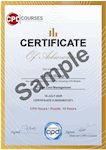Accounting and Finance : Journals and Subsidiary Books
Accounting and Finance : Journals and Subsidiary Books | CPD Accredited | 10 CPD Points/Credits
CPD Courses
Summary
- Exam(s) / assessment(s) is included in price
- Tutor is available to students
Overview
Accounting Journals and Subsidiary Books
In accounting, journals are the books used to record financial transactions in a certain order to keep a record of all the business transactions that take place; subsidiary books are subdivisions of the journal. They are also called books of original entry or books of prime.
This unit provides a comprehensive introduction to journals and subsidiaries, the subdivision of journals and different types of subsidiary books; it also illustrates the advantages of journals and subsidiary books, ledgers and subdivisions of ledgers. In this unit, candidates will learn the distinction between journal and ledger, types of subsidiary books and basic documents for subsidiary books.
CPD
Course media
Description
Accounting Journals and Subsidiary Books
Objectives
After completing this course learners will be able to:
- Understand the meaning of journals and ledgers
- Understand rules and subdivisions of ledgers
- Distinguish between journals and ledgers
- Define subsidiary books
- Describe the types of subsidiary books
Program Content
Lesson(s)
Introduction to Journals and Subsidiary Books
Topics
- Introduction to Journal and Subsidiary
- Advantages of Journal
- Subdivision of Journal
- Ledger and Subdivision of Ledger
- Distinction between Journal and Ledger
- Subsidiary Books
- Types of Subsidiary Books
- Basic Documents for Subsidiary Books
- Advantage of Subsidiary Books
Who is this course for?
Accounting Journals and Subsidiary Books
- New or recent recruits to banking and financial organisations
- Operations and support staff
- Finance and accounting staff
- Dealers and Traders
Requirements
Accounting Journals and Subsidiary Books
No prior knowledge is required to take this course.
*Note: This CPD Unit is offered on special discounted price on REED only and does not include awarding body accreditation charges. At the end of the unit, learner can claim CPD Accredited certificate by paying £35 accreditation fee and postal charges (£9 for UK students, £15 for outside UK).
Questions and answers
Currently there are no Q&As for this course. Be the first to ask a question.
Reviews
Legal information
This course is advertised on reed.co.uk by the Course Provider, whose terms and conditions apply. Purchases are made directly from the Course Provider, and as such, content and materials are supplied by the Course Provider directly. Reed is acting as agent and not reseller in relation to this course. Reed's only responsibility is to facilitate your payment for the course. It is your responsibility to review and agree to the Course Provider's terms and conditions and satisfy yourself as to the suitability of the course you intend to purchase. Reed will not have any responsibility for the content of the course and/or associated materials.



